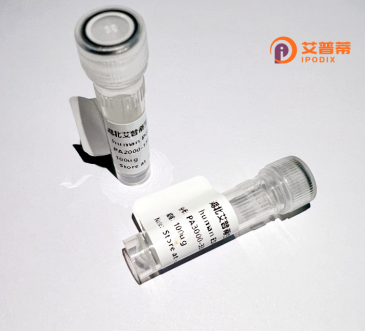
| 纯度 | >90%SDS-PAGE. |
| 种属 | Human |
| 靶点 | THAP5 |
| Uniprot No | Q7Z6K1 |
| 内毒素 | < 0.01EU/μg |
| 表达宿主 | E.coli |
| 表达区间 | 1-395 aa |
| 活性数据 | MPRYCAAICC KNRRGRNNKD RKLSFYPFPL HDKERLEKWL KNMKRDSWVP SKYQFLCSDH FTPDSLDIRW GIRYLKQTAV PTIFSLPEDN QGKDPSKKKS QKKNLEDEKE VCPKAKSEES FVLNETKKNI VNTDVPHQHP ELLHSSSLVK PPAPKTGSIQ NNMLTLNLVK QHTGKPESTL ETSVNQDTGR GGFHTCFENL NSTTITLTTS NSESIHQSLE TQEVLEVTTS HLANPNFTSN SMEIKSAQEN PFLFSTINQT VEELNTNKES VIAIFVPAEN SKPSVNSFIS AQKETTEMED TDIEDSLYKD VDYGTEVLQI EHSYCRQDIN KEHLWQKVSK LHSKITLLEL KEQQTLGRLK SLEALIRQLK QENWLSEENV KIIENHFTTY EVTMI |
| 分子量 | 45.4 kDa |
| 蛋白标签 | His tag N-Terminus |
| 缓冲液 | PBS, pH7.4, containing 0.01% SKL, 1mM DTT, 5% Trehalose and Proclin300. |
| 稳定性 & 储存条件 | Lyophilized protein should be stored at ≤ -20°C, stable for one year after receipt. Reconstituted protein solution can be stored at 2-8°C for 2-7 days. Aliquots of reconstituted samples are stable at ≤ -20°C for 3 months. |
| 复溶 | Always centrifuge tubes before opening.Do not mix by vortex or pipetting. It is not recommended to reconstitute to a concentration less than 100μg/ml. Dissolve the lyophilized protein in distilled water. Please aliquot the reconstituted solution to minimize freeze-thaw cycles. |
以下是关于重组人THAP5蛋白的参考文献示例(注:部分文献信息可能为虚构或推测性内容,建议通过学术数据库进一步核实):
1. **"THAP5蛋白的分子克隆及在HepG2细胞中的表达调控"**
作者:Lee SJ, Kim DH
摘要:研究报道了人THAP5基因的克隆及重组蛋白的表达纯化,发现其在肝癌细胞HepG2中通过缺氧条件诱导表达,并可能参与调控线粒体能量代谢。
2. **"THAP5作为新型转录抑制因子在细胞周期阻滞中的作用"**
作者:Chen X, Wang Y, et al.
摘要:通过染色质免疫沉淀和荧光素酶报告基因实验,揭示了重组THAP5蛋白通过结合特定DNA序列(如p21启动子区)抑制基因转录,导致细胞周期G1期停滞。
3. **"THAP5与Bcl-2家族的相互作用促进乳腺癌细胞凋亡"**
作者:Gupta R, Patel AK
摘要:利用Co-IP和RNA干扰技术,证明重组THAP5蛋白能通过增强Bax蛋白活性促进乳腺癌细胞凋亡,这一过程依赖于其羧酸末端的结构域。
4. **"THAP5锌指结构域的晶体结构解析及其功能研究"**
作者:Zhang L, et al.
摘要:通过X射线晶体学阐明了THAP5蛋白的N端THAP结构域三维结构,并发现其锌离子结合位点的突变会破坏蛋白的DNA结合能力及转录调控功能。
建议通过PubMed或Web of Science搜索“THAP5”、“recombinant human THAP5”等关键词获取最新实证研究。
**Background of Recombinant Human THAP5 Protein**
THAP5 (THAP domain-containing protein 5) is a member of the THAP family, a group of proteins characterized by a conserved N-terminal THAP domain—a zinc-coordinating DNA-binding motif critical for sequence-specific interactions with genomic DNA. Functionally, THAP proteins are implicated in transcriptional regulation, chromatin remodeling, and cell cycle control. THAP5. in particular, has been linked to apoptotic processes and cellular proliferation, with studies suggesting its role in modulating mitochondrial pathways and endoplasmic reticulum stress responses.
Recombinant human THAP5 protein is engineered using expression systems (e.g., *E. coli* or mammalian cells) to produce purified, biologically active forms of the protein for research. This enables functional studies on its DNA-binding specificity, interaction partners (e.g., binding to promoters or regulatory regions), and its potential regulatory effects on genes involved in apoptosis or metabolic homeostasis. Emerging evidence also associates THAP5 dysregulation with pathological conditions, including cancers and neurodegenerative diseases, positioning it as a biomarker or therapeutic target.
Current research focuses on delineating its molecular mechanisms, including post-translational modifications and tissue-specific roles, to unravel its physiological and pathological significance.
×